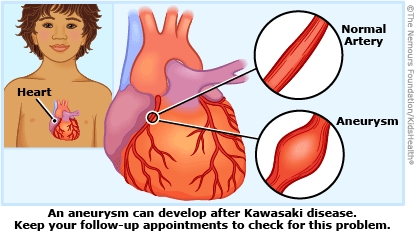Kawasaki Disease: How to Care for Your Child
Most children who have Kawasaki disease recover fully, but sometimes the disease can lead to heart problems. By monitoring your child's heart, the health care provider can find and manage any problems that occur.


Kawasaki disease is an illness that causes inflammation (swelling) in the skin, blood vessels, heart, and other parts of the body. These problems usually go away with treatment. But sometimes the swelling makes the walls of the heart's blood vessels bulge. Health care providers call these bulges "aneurysms." Aneurysms can lead to heart problems.
Heart doctors use a non-painful test called an echocardiogram to look at the heart and blood vessels of children who have had Kawasaki disease. During this test, sound waves are bounced off the parts of the heart. This creates a picture of the heart and blood vessels that run through it.
If the health care provider finds aneurysms or other problems, treatment may include medications, restrictions on certain types of exercise, or surgery. If everything is OK, your health care provider will likely still recommend that your child take a low dose of aspirin every day to prevent heart problems from developing.

-
Give your child any medicine prescribed by the heart doctor exactly as instructed.
-
Allow your child to rest when tired.
-
Follow the doctor's instructions for when your child can return to school and other activities.

-
Make sure your child goes to all follow-up visits with the heart doctor. Your child may need multiple checkups in the months following the illness and may need echocardiograms or other tests for at least 1 year.
-
Talk to the health care provider about getting the flu shot for your child and others in the household so that your child does not get the flu while on aspirin treatment. Getting the flu or chickenpox while on aspirin may increase the chance of developing a rare but serious illness called Reye syndrome.

Your child:

Your child:
-
Feels pressure or pain in the chest, shoulders, arms, neck, jaw, or back.
-
Has shortness of breath or trouble breathing.
-
Has belly pain or vomiting, especially if accompanied by sweating and pale skin.
-
Looks pale or is dizzy.
-
Faints.
-
Has trouble walking, talking, or moving.
-
Is an infant and cries inconsolably for no clear reason.